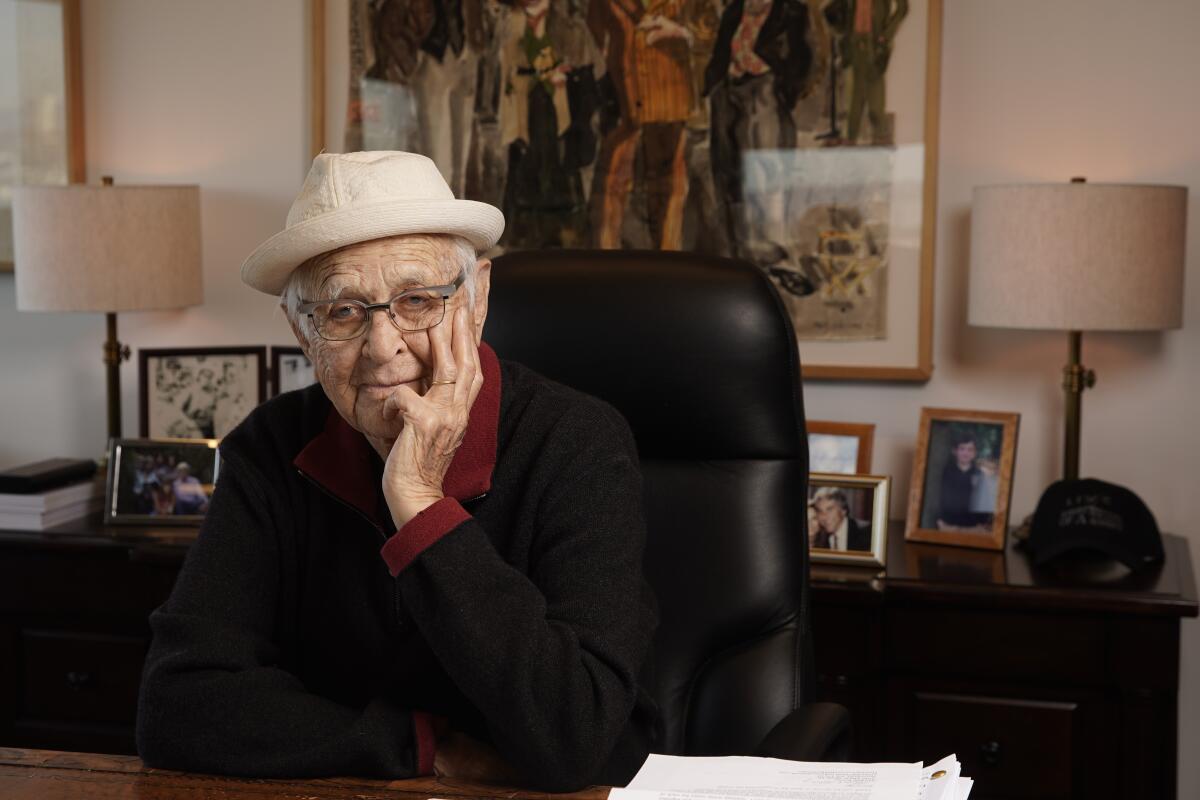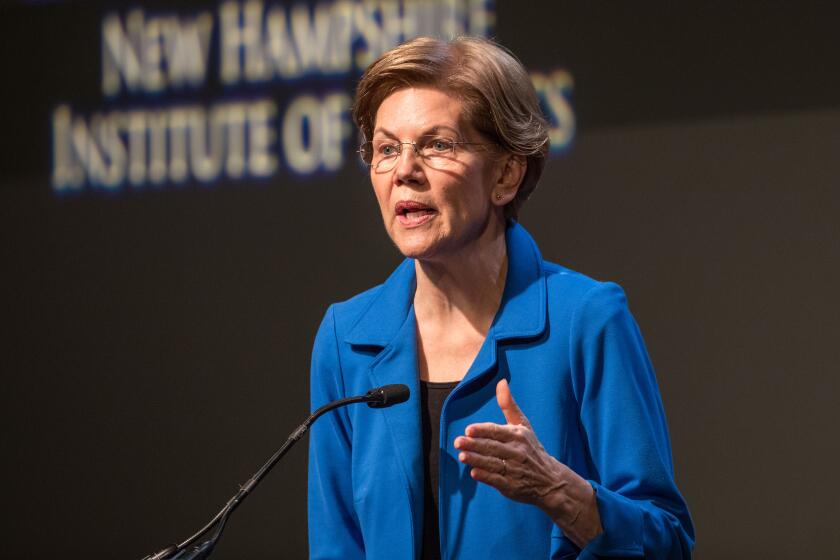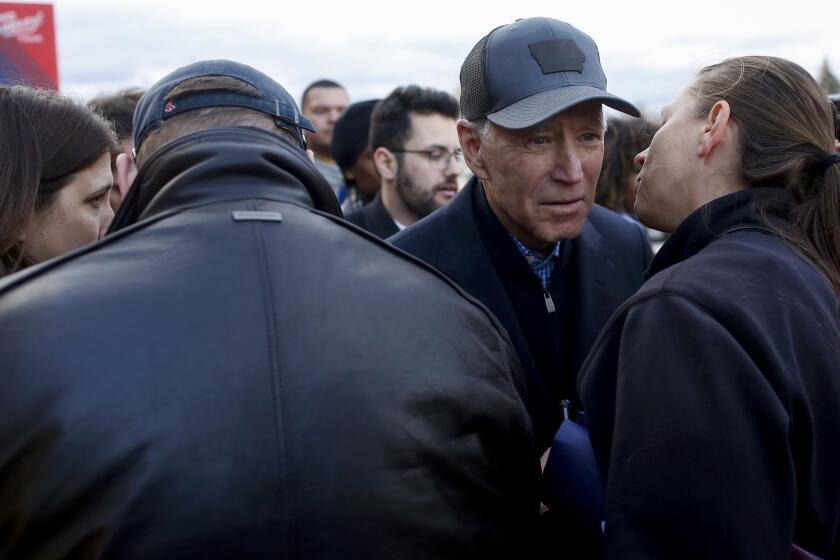Norman Lear, creator of Archie Bunker, is shocked at Trump and the state of America

- Share via
And so, Norman Lear, how do you think things are going in America these days?
“When I’m asked a question like that, my mind goes immediately to the youngest people I know,” he says. “It’s clear to me that young people are not growing up in the America I grew up in. It’s very different, and I worry about that.”
So begins a conversation with the entertainment impresario and political activist, the man who created the bigoted Archie Bunker and then his antidote, the left-leaning advocacy group the People for the American Way.
He is 97 and, on this day in Lear’s lair atop the Morita Building in the Sony complex in Culver City, he is wearing a light-colored porkpie hat, blue jeans, and a black vest covering a purple paisley shirt that’s open at the neck. Plus white socks.
He says things like: “I think all the time about why I haven’t been arrested.”
He lets the sentence linger, perhaps intending to shock. But in truth the shocks these days are felt by Lear himself: shock at the presidency of Donald J. Trump, shock at what he regards as the perfidy of the Republicans on Capitol Hill, shock at how the Democrats are responding. There’s enough shock in the room to light Los Angeles.
But there’s some light, too.
Lear is a barometer of political and social change, albeit one that responds to the barometric pressure on the right and then shapes the atmospheric pressure of the left. And right now his internal barometer records an important climate change in America and brims with short-term readings, especially about former Mayor Michael Bloomberg of New York:
“Of the candidates currently running,” Lear says, “he has more experience with what I imagine will be most helpful as president. So I find him interesting. I’ve had a couple of meals with him. I like him. He’s very smart and very interested.”
He stops to make sure his listener understands the difference between the words “interested” and “interesting” and then, convinced that the point has been made, adds: “He’s interested in life and things around him.”
But mostly Lear is interested in defeating President Trump, and he thinks the Democratic field has some strong contenders.
With a marquee speech in New Hampshire and a weekend campaign swing in Iowa, Warren tries to regain momentum by amplifying her economic argument and sharpening attacks on her Democratic rivals
“I like Elizabeth Warren. I like young Pete. But I have a sense Elizabeth Warren can make it. Long-, long-, longterm it would be healthy for the world to see a woman president. I believe she genuinely cares. I like the way she thinks of ‘us.’”
How about former Vice President Joe Biden? “I think Joe Biden is last year’s news.”
And Sen. Bernie Sanders of Vermont? “I love Bernie. But I don’t like him.”
Alternative media, with “Rising” and “The Young Turks,” has played a major role in Bernie Sanders’s success. And he’s helping those outlets grow.
Then this, about the face of Mitch McConnell, the Kentucky Republican sculpting the GOP strategy to win a Senate acquittal for Trump after his impeachment by the House:
“I don’t know anything I want to push a pie into more.”
Among centrist voters inclined to like Biden, the 37-year-old Buttigieg is becoming plausible as an alternative, and he highlights what Biden is not: energetic, articulate and young.
How has it come to this — a pie in the face of the Senate majority leader?
“I made a crystal radio set on a cigar box, and one evening I caught a voice and heard a phrase about Jesus. It turned out to be Father [Charles] Coughlin. It was the first time I learned there were enough people to have a radio show whose star hated me because my mother and father were Jewish.
“From that moment I had a nose for, and a sensitivity to, anti-Semitism. I was that little boy when I started to see the [Rev. Jerry] Falwells and the [Rev. Pat] Robertsons and the religious right. I felt I had to do something about it.”
Thus, People for the American Way.
“His love of country is the thing that may motivate him the most, and that his opponents don’t realize,” said Ralph G. Neas, the onetime chief legislative assistant to two Republican senators who served as president and CEO of People for the American Way from 2000 to 2007.
Not everybody likes Norman Lear, just as not everybody at the time liked “All in the Family,” a TV show that revolved around Archie Bunker, the patriarch of a working-class family who loudly spouted racist, homophobic, sexist and anti-Semitic views. Daily Variety described Lear’s signature series as “nothing less than an insult to any unbigoted televiewer.”
The irreverent sitcom provoked Laura Z. Hobson, the author of a novel that explored prejudice in America called “Gentleman’s Agreement,” to write a New York Times essay that argued, “I don’t think you can be a black-baiter and lovable, or an anti-Semite and lovable. And I don’t think the millions who watch this show should be conned into thinking you can be.”
Over the years, Lear has also given “Sanford and Son,” “Maude” and “The Jeffersons” to television viewers in the United States and around the world. It is television that his longtime producing partner Brent Miller described in an interview as entertainment “grabbed from the headlines on a daily basis.”
David R. Shumway, a professor of literary and cultural studies at Carnegie Mellon University, argues that “All in the Family” was notable for bringing contemporary political argument into American living rooms. “It was able to deal with controversial subjects and potentially offensive language by putting them in the mouths of characters who engendered empathy even in the face of disagreement or disapproval.”
But for Lear, Trump engenders no such empathy in the face of his disagreement and disapproval.
“It angers me that the media doesn’t call attention to the fact that he can be described in psychological terms,” he says. “I feel qualified to say in some sense that he’s not a well man.”
And he has just as much contempt for congressional Republicans:
“Despite the fact I’m a Democrat and they’re Republicans, I’m still a human being — a father, a grandfather and a citizen of this country. They are, too. I don’t understand them as human beings, how they can allow themselves to be led by this president.”
What ties together men and women of advancing ages — what ties together former Supreme Court Justice Sandra Day O’Connor, a post-bench crusader for political education, and Lear, who refuses to sit on the bench in today’s raucous political climate — is regret that civics classes largely have disappeared from the American secondary-school curriculum.
“My priorities — the preamble of the Constitution and the Declaration of Independence — we are not as aware of them as we once were.”
Thus begins a riff from a man who flew 52 World War II missions out of Italy:
“We loved America in a way my children don’t know how to love America. ... We learned to care about America for what it promised, what it intended. We weren’t fooled to know it kept all its promises, but it was on that road. There was reason to think, ‘God bless America.’”
He won’t be stopped there. He goes on:
“I remember coming back from the war feeling that so keenly: Look what we did. And we helped Europe get on its feet again. We had leaders who taught the American people that we were the good guys and God’s chosen. The passion to keep the promises dissipated.”
While Lear is firmly part of America’s cultural canon, he is increasingly, at age 97, a part of the American past. But with his indefatigable will, Lear is still focused on America’s future.
More to Read
Get the L.A. Times Politics newsletter
Deeply reported insights into legislation, politics and policy from Sacramento, Washington and beyond. In your inbox twice per week.
You may occasionally receive promotional content from the Los Angeles Times.













